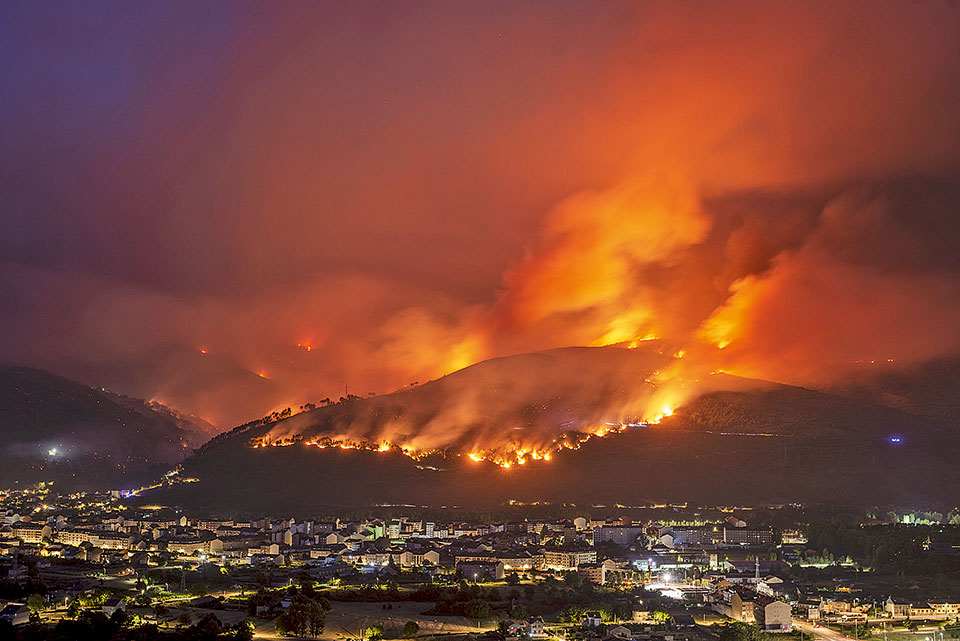
Kathimerini Greece Newsroom
by Yannis Elafros
Record high temperatures in many Western European countries, with record highs in Britain, France, Germany and elsewhere, as well as persistent prolonged heat in the Iberian Peninsula, are the culmination of a long upward trend in Europe's summer temperatures this year.
"Europe is rising three times faster in the frequency of heatwaves and four times faster in terms of their intensity,"
"Western Europe is emerging as a hot spot of climate change, where heat waves occur more frequently and more intensely than in other regions with the same latitude," Ms. Efi Rousi explains to Kathimerini. Ms. Rousi is a researcher at the Research Institute for Potsdam Climate Impacts just outside Berlin. She is also the lead author of a recent study published in the journal called Nature Communications ("Accelerated western European heatwave trends linked to more-persistent double jets over Eurasia"), according to which the upward trends in the occurrence of heatwaves in Europe over the past four decades are three to four times stronger compared to the rest of the northern midlatitudes of the earth.
"There is a common fact all over the planet. Human-caused climate change, due to increased emissions of greenhouse gases leads to an increase in the average temperature, which also leads to extremes, such as this year when we have record temperatures. This means that we will have more frequent, more intense, more persistent heat waves. But not all regions move in the same way. We wanted to see what was happening in Europe and why", she emphasized to Kathimerini.
 Researcher Efi Rousi is the lead author of a recent study on climate change published in the journal Nature Communications.
Researcher Efi Rousi is the lead author of a recent study on climate change published in the journal Nature Communications.
In Western Europe, it is not easy to forget the deadly heatwave of 2003, when an estimated 70,000 unexpected deaths were linked to the scorching conditions. The publication in Nature Communications further highlights the recent cluster of consecutive extremely hot and dry summers of 2018, 2019 and 2020. "European heatwaves are projected to increase disproportionately compared to the global average trend," the journal stated.
The Mediterranean hotspot of climate change
"Until now we have known that the Mediterranean is a hotspot of climate change; but what about Western Europe? We looked at 42-year trends, up to 2020, even focusing on persistent heatwaves lasting six days or more. We compared these trends with other regions of the same, mid-latitude belt in the Northern Hemisphere, such as North America, Asia, etc. The picture we have is that heat waves in Europe are increasing faster than average. Only the west coast of the USA registers similar trends. In particular, Europe is rising three times faster in the frequency of heatwaves and four times faster in terms of their intensity," explains the Greek researcher.
Very important for countries that until now have seen sporadic heatwaves and incidents of heat invasions, leaving residents completely unprepared, as well as infrastructure, buildings, homes, etc.
But what accounts for the growing trend? The research subject of Ms. Rousi and her collaborators concerns air circulation in the upper atmosphere. So they examined what is the role of the jet stream, which moves from the west, from the Atlantic Ocean to Europe and covers Central and Northern Europe. "They are very strong winds, which cool the summer and make the winter milder. The areas affected are Western Europe, the Iberian Peninsula, the United Kingdom, and Scandinavia," notes the RIK researcher.
"But when we have a split of the air stream into two parts, one heading towards Northern Europe and one moving towards the Mediterranean, then the strong winds in the center are not there, so it is more likely that the warm air masses will remain and create episodes of heat over Western Europe," he explains.
According to the publication in Nature Communications, almost all of the increased heat events in Western Europe, and about 30% of those in the wider European region, are linked to the splitting of the westerly jet stream. There is a strong possibility that the double jet stream is also linked to this year's extreme heat events in Western Europe, although the full evidence is not yet available.
"Obstacles" in the airstream are blocking anticyclones, the systems that brake the circulation of air in the upper atmosphere. Are anticyclones "to blame" for the splitting of the jet stream, or does the splitting cause the anticyclones? "We still don't have an answer to this, further research is needed," the Greek climatologist answers.
The fires
What can we expect in the future? To the extent that greenhouse gas emissions continue to increase or remain high, all climate models show an increase in temperatures and extreme events. The consequences will be even more serious, as with the fires that are a function of many factors related to climate change: high temperatures, heat waves, more drought, more flammable fuel.
Ms. Rousi does not raise her hands. "There are solutions, we are not doomed. The attitude of each of us is very important, but of course, dealing with climate change is a political matter, it requires comprehensive decisions at the level of society".

40C and above were recorded in many parts of Germany. The decreasing water levels in many rivers, such as the Elbe, caused problems for navigation, while thousands of calls were received by emergency services in Berlin.
14 cities were on alert in Italy due to the unbearable heat at the end of the week, including Rome and Milan. A large part of the Po was covered with algae. At the same time, fires were still raging in Tuscany and in the Friuli-Venezia Giulia region, burning thousands of hectares of forest and agricultural land to ashes.

900,000 hectares were burned by fires across Spain last week. The country is experiencing the worst fire fighting season in the last decade. Extremadura, in the west, and Castile and Leon in the central country were targeted. At the same time, the unprecedented heatwave left behind at least 1,000 dead.































